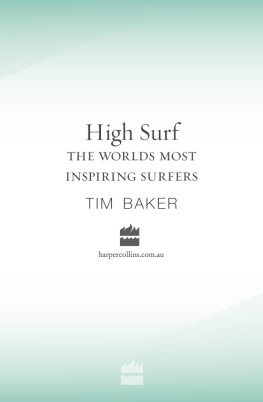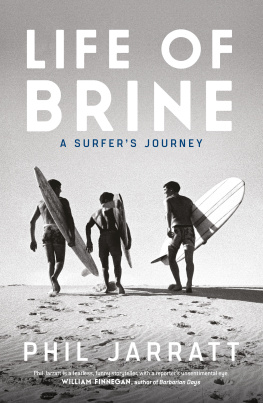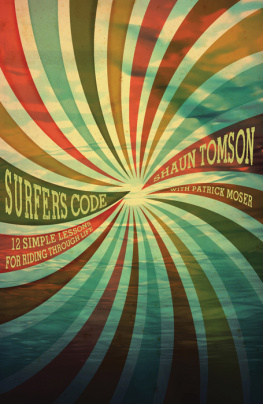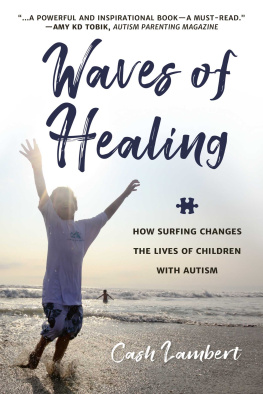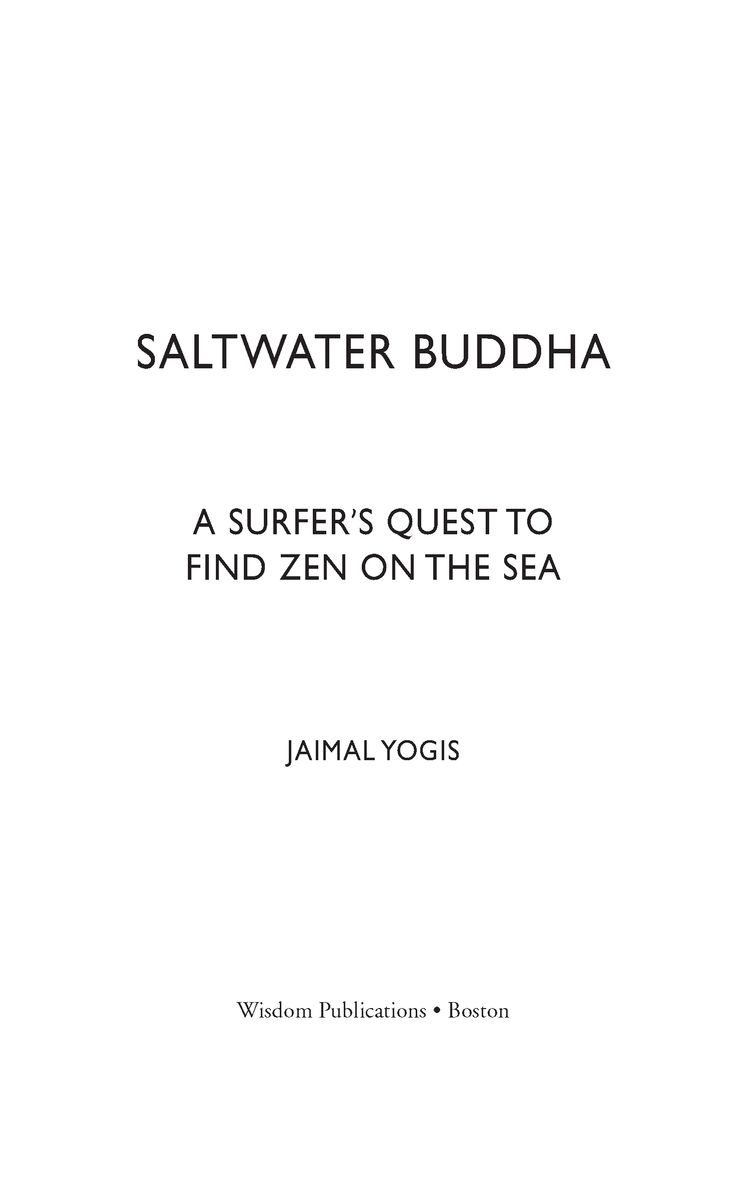Table of Contents
More Praise for SALTWATER BUDDHA
A motivating book that reminds us to follow our hearts without fear and limitations. Refreshing, easy-to-read, and a lot of fun.
Urijah Faber
In this terrific first book, Jaimal Yogis has done what every artist and writer strives to do: he has made something beautiful and universal from the particulars of his own life. Saltwater Buddha will surely find the audience it deservesamong surfers, among seekers, and among those who enjoy being swept along on a curious ride.
Daniel Duane, author ofCaught Inside
Jaimal Yogis starts off as an Everyteen with two deep hungersto learn surfing and to calm his mindand his simple, amused, deadly serious report on how he tries to satisfy those desires may ultimately launch an entirely new breed of memoir: the coming-of-sage story. Yogiss prose is etched yet effortless, a conversation with a friend who pretends to be nave, but has clearly drunk up so much life experience that you trust his authority as a truth-teller more than you know. He rocked me happily for chapters as he recounted his journey from an Atlantic island to California suburbs to a series of beach towns (including, memorably, Brooklyn). But each time I was lulled, I always was also on edge, wondering if bigger surf may be coming. Indeed, it was: several moving, sharp-edged episodessets, reallythat will stay vivid in my mind for a long, long time.
Bruce Kelley, editor-in-chief ofSan FranciscoMagazine
At sixteen, Jaimal Yogis ran away on a spiritual journey of a magnitude few of us even dream of, to learn to ride the waves of the worlds oceans, and the bigger surf within his own mind. As Jaimal gains hard-won spiritual lessons with a teenagers eagerness and a surfers passion, we cannot help but see our own spiritual life with fresh, beginners eyes. His journey started in nothingnessat least in a material sense. But it ends in deep riches of spiritual insight, human warmth, and humor. The pages kept turning. I couldnt put this book down.
Michael Ellsberg, coauthor ofFlirting with Disaster
Prologue
The ocean is in constant flux, and when you spend a lot of time in it you become like a floating bottle with a message inside; you know youre going somewhere, sense you have a purpose, but you also know youre at the mercy of the winds and currents, that surrendering may be your only good option.
Lately Ive been surfing a lot. And theres some-Lately Ive been surfing a lot. And theres something different about the saltwater life. One becomes floppy, like seaweed, while at the same time agile, like an eel. One becomes, I suppose, more like water itself. The Tao Te Ching says, Nothing in the world is more flexible and yielding than water. Yet when it attacks the firm and the strong, none can withstand it. They have no way to change it.
This is a book in praise of water. On its surface, it is a series of short stories about my encounters with the sea and Zen practice. But underneath, its just a homily about waterto that which sustains life.
I am no expert on Zen, and certainly no expert surfer. But I have an ongoing love affair with the ocean, which, through years of meditation, I have come to view through what might be called Zen-colored glasses. If I have a message inside this empty vesselif it hasnt been completely dissolved by the saltwater leaking inthis book is it. May the winds blow it to shores where it will be useful.
Introduction
In water, everything is dissolved.
Mircea Eliade
A person of the Way fundamentally does not dwell anywhere. The white clouds are fascinated with the green mountains foundation. The bright moon cherishes being carried along with the flowing water.
Hung-chih
Ua ka ua, kahe ka wai.
The rain rains, the water flows.
Hawaiian Proverb
In Zen there is nothing to explain, nothing to teach that will add to your knowledge. Unless it grows out of yourself, no knowledge is really of value to you, a borrowed plumage never grows.
D.T. Suzuki
Two weeks ago, I moved onto my girlfriends dads sailboat in Sausalito. Dulce is the boats name. She is thirty feet long, mostly white with lacquered wooden paneling around the windows. Her sails are wrapped in teal canvas.
At first, I thought Dulce rocked too much. But now she lulls me to sleep. The bed is so small, curling up in it while the waves lap against the hull is a bit like returning to the womb: not that I remember the womb, of course, but I imagine it to be something like sleeping in the bow of a sailboat.
I dont sail. Simply to live on the water is the point. After a couple years sequestered inland, always driving to the coast for surf, being on the boat feels like a homecoming. To come back down to the ocean, writes Thomas Farber, in On Water, is to reexperience an essential memory trace, something once known well, to recall that one has been trying to remember. I like that Farber writes to recall that one has been trying to remember rather than, to recall what one has been trying to remember. It describes the truth that when away from the sea you can easily forget what you feel homesick for. But the vestiges are always there. And upon return, the salt air, the incessant roar of waves, what Mark Twain calls the limpid depths.
Basho, the seventeenth-century Zen monk and poet, said in a haiku:
Mother I never knew
Every time I see the ocean
Every time
Maybe having evolved from aqueous amoebas, and being in our current form two-thirds water, we are hardwired to connect to the sea.
Or maybe we are even part of waters big plan. Tom Robbins suggests that human beings (like every other living creature) were invented by water as a device for transporting itself from one place to another.
Farber points out that we are not so far removed from the sea as we think: our skin is smooth like that of a dolphin or whale; our fingers and toes are slightly webbed; we float; we are streamlined and surrounded with a subcutaneous layer of fat; our blood itself is close to the consistency of seawater. And as demonstrated in recent years by free divers, we even have the capability, like dolphins and whales, to slow down our heart rate in order to reach great depthsmore than 400 feet without oxygen.
THE VIEW FROM THE BOAT is impressionistic: specks of light flickering on the bay like stars looking up. The golden grasses of Angel Island twitch under the first rays of light. Directly south, the San Francisco skyline stretches up, barely cresting a comforter of foga city inside a snow globe, as Anne Lamott once described it. North, Mount Tamalpais, a pyramid of green, blocks the winds, creates this sanctuary: one of the most expensive stretches of waterfront property on the planetexpensive, that is, unless you live on your girlfriends dads sailboat.
As on many mornings in Marin, there is this sly strip of fogwater in its most mystical incarnationslithering over, around, and through the hills, making everything look ancient and unsolved. I climb back down into the cabin, a cramped space barely tall enough for me to stand in, and sit down on a little bench, pulling my legs into full lotus: left foot on right thigh, right foot on left. Today will begin, as most mornings do, with a little zazen, a little Zen meditation.


